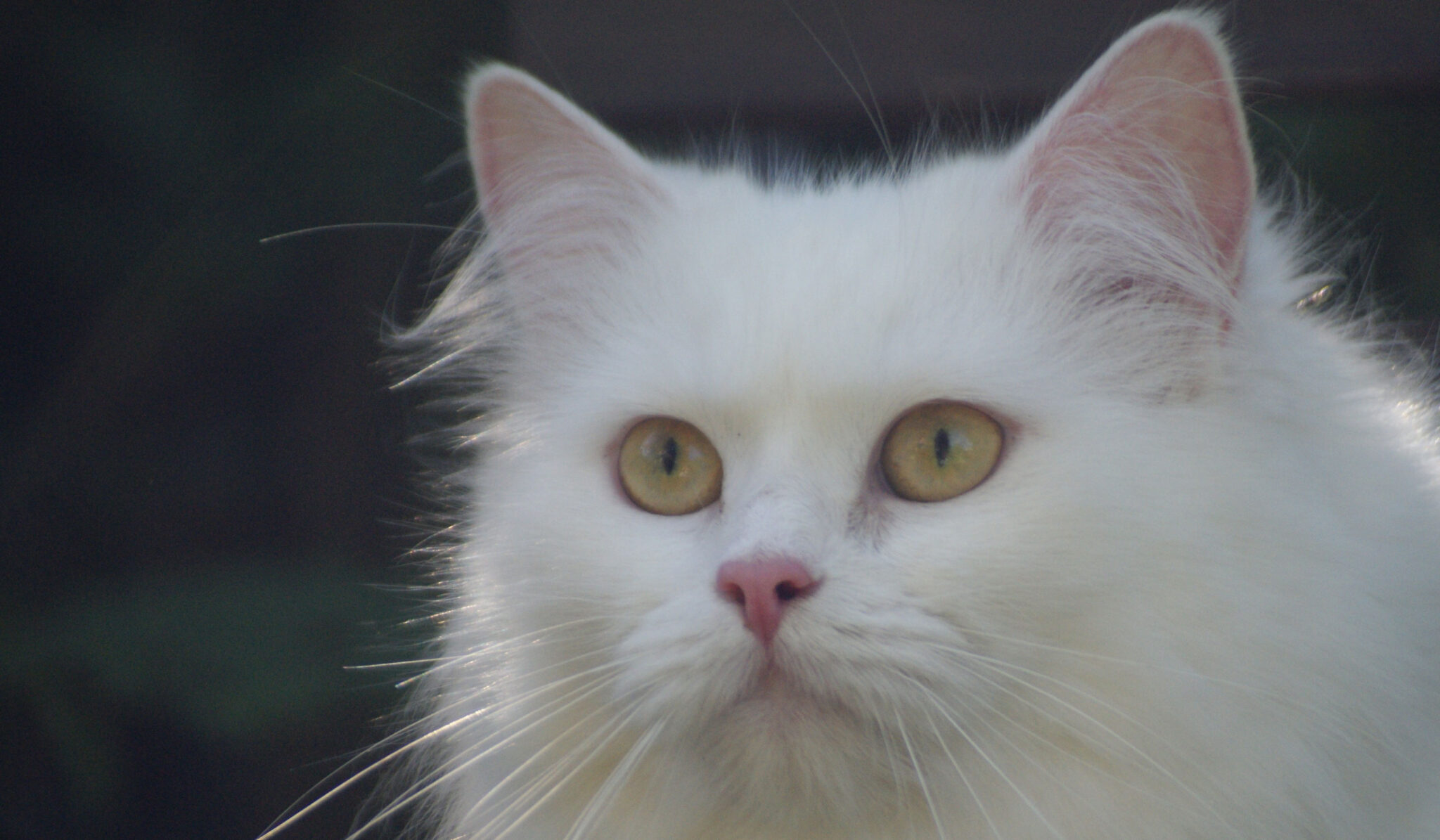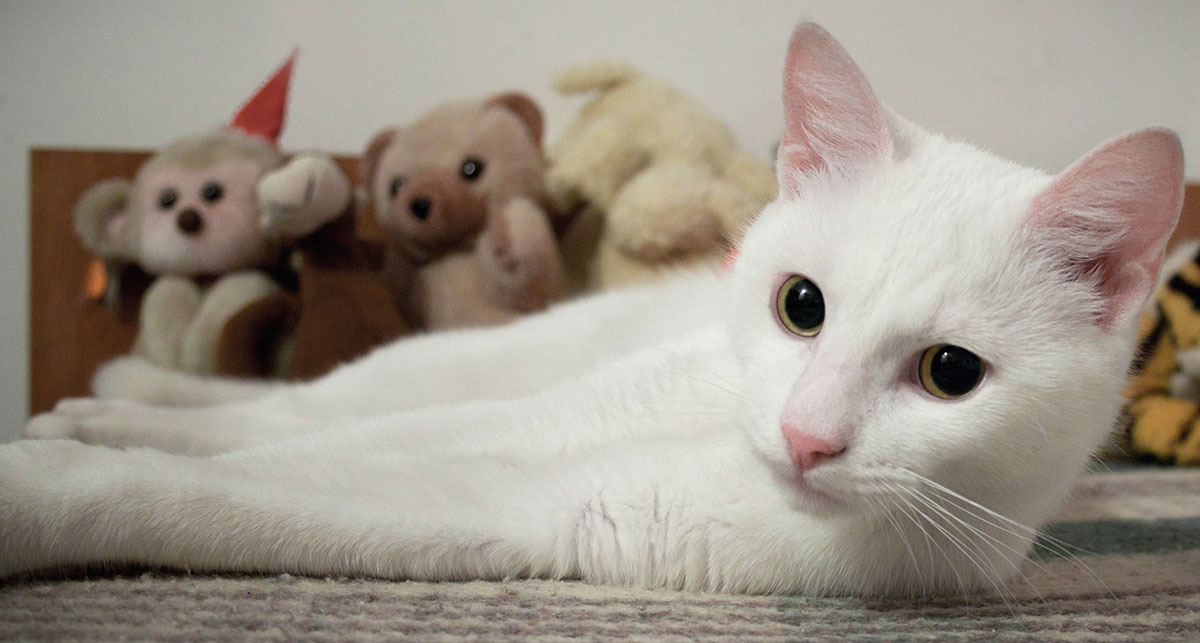Most cats can hear the fridge door opening from three rooms away.
Their acute sense of hearing evolved to help them hunt (before fridges), and the range and sensitivity of cats’ hearing even rivals that of dogs.
But what if you begin to notice that your cat hasn’t heard you enter the room?
In this article we take a look at the causes of hearing loss in cats, living with a deaf cat, and explore the curious link between white cats and deafness.
Deafness in cats
Cats can be born with hearing loss (described as congenital hearing loss), or they can lose their hearing later (known as acquired hearing loss).
In both cases, hearing loss can be partial, or complete.
Congenital hearing loss in cats: are white cats deaf?
Any cat can be born deaf, or with some hearing loss. But if your cat has any coloring in their fur, the chances being born deaf are extremely rare.
However, when a cat is completely white all over, the odds of it being deaf or having some congenital hearing loss suddenly shoot up to around 20%.
When a completely white cat also has two blue eyes, they have a 65-85% chance of being deaf or having some hearing loss.
There’s even a middle ground – when a completely white cat has one blue eye, and one non-blue eye, there’s a 40% chance of them being deaf or hard of hearing.
Breed doesn’t matter, these odds are the same across all breeds.
Why are white cats deaf?
Well, white cats carry a gene called the white masking gene.
The white masking gene stops the cat making melanocyte cells properly.
In non-white cats, melanocyte cells make melanin, which gives their coats color.
Without melanocytes, white cats can’t make melanin, so their coat grows white.
But here’s the thing, we (not just cats – us too) also have melanocytes in the lining of our inner ear.
And we don’t know why yet, but if they’re missing, the structure of the inner ear deteriorates, causing hearing loss or deafness.
Are all white cats with blue eyes deaf?
No. It’s a popular misconception, but as we’ve seen, around one in five will still enjoy normal hearing.
Because the structure and workings of the inner ear are so incredibly complex, we don’t fully understand why this is yet.
We might have an answer soon though: one in seven humans are affected by hearing loss, and understanding how our ears work and the role of melanocytes is a very active field of research.
Acquired hearing loss in cats: can cats go deaf?
Cats born with perfect hearing can become deafened in later life in several ways.
These are just some of the most common causes of deafness in cats:
Age-related hearing loss
Like ours, cats’ eardrums gradually thicken as they get old, causing their hearing to fade. The clinical name for this is presbycusis.
Ear infections
Ear infections start in the outer ear, when bacteria enter and start to grow out of control in the ear wax.
This causes inflammation and the discharge of even more ear wax, which causes the ear canal to become blocked.
Treated promptly by a vet, an ear infection should clear up rapidly and your cat will regain their normal hearing.
But left untreated, infection can spread to the middle and inner ear. Whilst the infection can still be treated, your cats is more likely to suffer permanent hearing loss.
Ear mites
Ear mites are highly contagious microscopic parasites which live in animals’ ear canals.
They cause the most infuriating itching sensation inside the ear, which cats try to alleviate by scratching.
If the scratching continues over a prolonged period, it can damage the skin, allowing ear infections to get in.
As described above, the infection can then cause hearing loss if left untreated.
Ototoxic medicines
Some medications are ototoxic, meaning one of their side effects is hearing damage. Examples include some antibiotics and medicines for controlling diabetes.
Your vet will tell you if a medicine they recommend could damage your cat’s hearing.
They won’t prescribe these medicines lightly: sometimes the risk of side effects must be weighed against the risk of leaving an ailment untreated.
Prolonged exposure to loud noise or blunt force trauma
These causes rather speak for themselves.
Excessively loud environments or head injuries can kill the tiny hair cells in cats’ ears which turn sounds into electrical signals and send them to the brain.
These cells can’t regrow, so losing them results in irreversible hearing loss.
Is my cat going deaf?
The usual signs of deafness in cats are:
- Failing to respond to sounds they usually notice (keys in the front door or a can opener cracking open their next meal for example),
- Startling more often, because something has suddenly come into their field of vision which they hadn’t heard coming,
- Meowing more loudly – a deaf cat meow if often louder because they enjoy the sensory stimulation from the vibrations, especially if they find themselves in an echoey space!
Diagnosing cat hearing loss
Cats born with congenital deafness can be recognized by the time they are old enough to leave their mum, so a responsible breeder will tell you if they suspect hearing loss in a kitten.
If you notice your cat’s hearing has deteriorated, take them to the vet.
Your vet will examine they to determine the underlying cause of the hearing loss, and whether it can be treated or reversed.
Even if your cats isn’t showing any signs of hearing loss, always take them to the vet if their ears are inflamed, producing an unusual discharge or dark, crumbly debris, or if your cat can’t stop scratching their ears.
These could all be signs of an infection or ear mites, and prompt treatment is essential to save your cats hearing.
Typical treatments for hearing loss in cats
Ear infections and ear mites are usually treated with antibiotics and anti-parasitics, and the hearing loss disappears as the infections subsides.
Unfortunately there is currently little that can be done to alleviate permanent hearing loss in cats.
Caring for a deaf cat
Luckily for the deaf cat, they are still blessed with their sight, and an uncanny sense of touch.
Kittens born with congenital deafness will have never experienced hearing, so they won’t even have a sense of having lost something.
With some common sense precautions to keep them safe, deaf cats can adapt remarkably well.
Deaf cats won’t be able to hear threats like a car or dog approaching, so always keep your deaf cat indoors, unless you can provide a completely enclosed outdoor area for them to enjoy (in which case do! They’ll love you for it!).
For a cat used to being outdoors, being confined to the house can be a difficult adjustment, so make sure they have lots of toys available to keep them active.
You might be impressed by how sensitive your deaf cat is to vibrations. Try stamping a couple of times as you approach, to alert them that you’re nearby.
Get into the habitat of making sure your cat has seen you before you touch them, to avoid startling them and making them nervous of you.
How to train a deaf cat
Modern animal training is carried out using positive reinforcement.
This means that we teach the animal to associate the correct response to a cue (coming to a whistle for example) with a great reward.
With deaf cats or dogs we need to be a bit more inventive with our cues. So instead of a whistle or a word, we must use a visual or tactile cue
A hand signal, vibration or flashing light are good choices.
Just as with hearing cats, building a strong association with your cue and the reward, is very important.
We’ll be bringing you more cat training tips in the weeks to come, in the meantime you could try three sharp taps on the floor, given just before you put your cat’s dinner bowl.
He’ll be able to feel the vibration even though he can’t hear the sound.
And remember, if you use the signal at other times, to make sure you follow it with a tasty treat, or a brilliant game.
Preventing hearing loss in cats and kittens
Some kinds of acquired hearing loss can be prevented by examining your pet’s ears regularly and taking them to the vets promptly at the sign of ear complaints.
If you have a completely white cat, even one with perfect hearing, bear in mind they still carry the white masking gene, which could still make their kittens deaf.

think carefully before breeding from your white cat
In some countries, animal rights legislation already discourages breeding completely white cats, to reduce the number of deaf kittens being born.
If you’re thinking of breeding your white cat, think carefully about whether it is in their future kittens best interests, and whether they can definitely be kept safe if they are born without hearing.
Summary
Just like being a deaf human, being a deaf cat is not without challenges, but it’s not a barrier to a happy and fulfilling life either.
Whether you discover your kitten has been deaf from birth, or that your elderly cat is gradually losing their hearing, you can use the training and communication techniques above to build a clear and confident rapport with them.
Is your cat deaf?
What steps do you take around the home to keep them safe and help them enjoy their space? What training techniques have worked for you?
Please share your tips in the comments section.
Today’s article is by Sarah Holloway. Sarah holds a bachelors degree in Zoology and has a special interest in animal behavior and communication
References
Cornell Feline Health Center, “Ask Elizabeth: White Cats and Blindness/Deafness”, www.vet.cornell.edu.
Cornell Feline Health Center, “Feline Ear Disorders”, www.vet.cornell.edu.
Cvejic, D. et al, (2009), “Unilateral and Bilateral Congenital Sensorineural Deafness in Client-Owned Pure-Breed White Cats”, Journal of Veterinary Internal Medicine, 23(2): 392-395.
Kral, A. & Lomber, S. G., (2015), “Deaf white cats”, Current Biology, 25(9): 351-353.
Ryugo, D. K. & Menotti-Raymond, M., (2012), “Feline Deafness”, Veterinary Clinics of North America: Small Animal Practice, 42(6): 1179-1207.
Strain, G. M., (1996), “Aetiology, prevalence and diagnosis of deafness in dogs and cats”, British Veterinary Journal, 152(1): 17-36.
Webb, A. & Cullen, C. L., (2010), “Coat color and coat color pattern-related neurologic and neuro-opthalmic diseases”, The Canadian Veterinary Journal, 51(6): 653-657.




I have had 7 white kitties over the years. Two of them were completely deaf from birth & most of the others were deaf in one ear. One of the completely deaf had a blue & a gold eye & the other, who is 18 1/2 yrs old, has 2 gold eyes. One w/ 2 blue eyes was deaf in one ear. One had 1blue & 1 blue w/gold squares was deaf in one ear. 1 I have now w/a chronic ear problem is losing hearing in the bad ear. His mother has gold eyes and can hear good. I had 1 w/gold eyes,who could hear good, but went blind!! They were all different but they were all very intelligent & they were & are greatly LOVED!!! ???
18 and a half is a great age!
I can’t keep my deaf cat away from the stove. He also is epileptic and cross-eyed. He turned one of the knobs on the stove when I was away for a weekend and almost blew up the house. Thankfully my neighbor went to check on him and his brother and caught it in time. I removed the stove knobs and now he’s been climbing on top of my gas stove, getting under the grates and removing any and all parts that move. I covered the stove with a bunch of pans and he just knocks everything down and starts to toss th parts like they are hockey pucks. I’ve taken my stove apart to keep him safe, making my kitchen unfunctional. I tried a scat mat but the shock was too much for him, even set in low, and caused his first seizure. I’ve tried the mats with the spikes and they don’t bother him. He climbs up on them anyway. I’ve tried spraying him with water he seems to enjoy it. I’ve tried double scotch tape for two months and as soon as I removed it, he was back on the counter. I’ve tried the boundaries spray but it makes me gag and is good only for a few hours at a time. After realizing he is deaf I’ve given up on any gadget that makes noise since it’s ineffective in his case. Please help. My daughter loves this kitty and I don’t want to give him up but I’m at wits end. I’ve researched indoor fences but I haven’t found anything designed for a cat.
Very helpful article! However, do more research on acceptable terminology! Hearing impaired is an offensive term- “hard of hearing” is the term you would want to use from now on. Luckily cats can’t take offense but people that are deaf or hard of hearing certainly would
Hi Megan, We are happy to change this in the article. Sorry for any offence caused. Best wishes, Pippa.
My cat Doozer is Black and 15 years old. Doozer likes to ride on my golf cart. One day I was shooting on my gun range. I didn’t notice that Doozer had laid down in front of the shooting platform. One shot from a rifle took his hearing. So I’d say be careful and aware when creating loud noises like fireworks and gun fire. I feel responsible for his loss and can never forgive myself for his loss.
My 19 year old cat went blind last year. She’s adapted to it very well, but now I’m beginning to think she’s gone deaf, too, and may have been deaf for some time. She doesn’t respond to our calling her name, or to sounds she used to respond to, like my tapping on her dish when I feed her, or shaking her treat can. She does respond somewhat to our voices when we talk to her before picking her up or petting her, so that we don’t startle her, but I am beginning to think she feels the vibration of our steps as we approach her, or maybe even the vibration of our voices, more than really hearing us. She seems to be getting along well, deaf or not, but I’m beginning to think I’ve got the Helen Keller of cats.